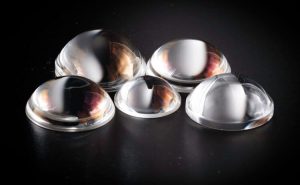Pros and Cons of Aspheric Lenses
Aspheric lenses stand out in optical applications, offering distinctive advantages over traditional spherical lenses. This discussion will delve into these benefits and explore potential drawbacks, drawing insights from various sources.

Aspheric Lenses
Advantages of Aspheric Lenses
- Lightweight and Impact-Resistant: Despite their thinner profile, aspheric lenses are typically lighter, ensuring extended comfort during wear. They also maintain excellent impact resistance, prioritizing the safety of the wearer.
- Thinner and Slimmer Profile: Aspheric lenses can adopt flatter base arcs, resulting in a thinner and slimmer profile. This aesthetic advantage not only improves appearance but also reduces peripheral magnification, preventing distortions that may alter the perceived size of the eyes.
- Optical Advantages: Aspheric lenses are meticulously designed to minimize aberrations, particularly spherical aberration. Unlike traditional spherical lenses causing blurriness, aspheric lenses focus light uniformly, ensuring clearer and sharper vision regardless of entry angles.
- High Luminosity Performance: Aspheric lenses maintain clear vision even at high prescriptions, outperforming traditional spherical lenses in optical quality. This feature makes them versatile for a wide range of prescriptions.
- Improved Peripheral Vision: Aspheric lenses excel in providing enhanced peripheral vision compared to spherical counterparts. This means wearers experience clarity not just in the central field but also towards the edges, contributing to overall visual comfort and safety.
Disadvantages of Aspheric Lenses
- Spherical Eye vs. Aspheric Lens: The natural spherical shape of the human eyeball may lead to a perception adjustment period for wearers, particularly when viewing objects through the edges of aspheric lenses.
- Smaller Light Area: Aspheric lenses have a relatively smaller light area, potentially causing slight blurring when the eye rotates. This limitation may reduce the visual range of the line of sight.
Applications of Aspheric Lenses
- Condensers: Aspheric lenses outperform spherical lenses in light collection, direction, and reduction of spherical aberrations. They enhance light transmission, increase collection efficiency, and allow for higher numerical apertures in condenser systems, crucial in applications like microscopy.
- Telescopes and Zoom Lenses: Aspheric lenses reduce the number of elements, lower f-numbers, and enable portability in optical systems. They offer wider zoom ranges, extended focal lengths, and wider fields of view in telescopes and zoom lenses.
- Medical Imaging: Aspheric lenses find applications in medical devices such as endoscopes and ophthalmic lenses, improving image quality and reducing spherical distortion.
- High-Resolution Imaging: Reduced spherical aberration in aspheric lenses benefits high-performance imaging systems, particularly in ophthalmological applications.
- Laser Beam Shaping: Aspheric lenses can transform Gaussian laser beams into Top Hat beams, ensuring homogeneous intensity distribution. This is valuable in applications requiring uniform illumination, such as metrology, microscopy, or material processing.
Aspheric lenses significantly enhance optical performance by correcting aberrations, providing clearer vision, and improving peripheral vision. Their aesthetic advantages, including a slimmer profile, further contribute to their appeal. However, they come with limitations such as a smaller light area and potential adjustment challenges for individuals accustomed to spherical lenses.
Advances in manufacturing have made aspheric lenses more affordable and versatile, allowing them to replace multiple spherical lenses in various applications. This results in cost-effective and high-performance optical systems, making them a preferred choice in diverse fields.
Do not hesitate to contact Shanghai Optics today. We’d be more than happy to discuss your projects and how best they can become a success.
